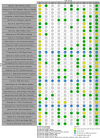Translated versions of the English satisfaction with life scale (SWLS) among adult participants: a systematic review
- PMID: 41102792
- PMCID: PMC12532450
- DOI: 10.1186/s40359-025-03498-y
Translated versions of the English satisfaction with life scale (SWLS) among adult participants: a systematic review
Abstract
Background: Life satisfaction is the cognitive assessment of an individual's current life circumstances. Since its introduction, the Satisfaction with Life Scale (SWLS) has been translated into more than 30 languages. However, there is a limited information on the comprehensive synthesis of the psychometric methods of the translated SWLS versions. This systematic review aims to synthesize published studies on the psychometric methodologies of the translated versions of SWLS in the global population.
Methods: This systematic review was guided by the Preferred Reporting Items for Systematic Reviews and Meta-Analyses (PRISMA) reporting guidelines. The investigators utilized the Joanna Briggs Institute (JBI) checklist for systematic reviews and Grading of Recommendations Assessment, Development, and Evaluation (GRADE) to evaluate the study's evidence. The manuscript was pre-registered with NIHR PROSPERO.
Results: All studies, except one (Quechua), demonstrated adequate internal consistency (α = 0.74 to 0.89) of the translated SWLS, with most studies using Cronbach's α as the sole measure of internal consistency. Few studies explored other forms of reliability (e.g., test-retest). All studies reviewed evaluated various types of construct validity (convergent, discriminant, and measurement invariance) and criterion-related validity (concurrent). Only one study explored content validity.
Conclusion: Future studies should prioritize a standardized psychometric methodology when translating and validating the SWLS in languages and regions where research on subjective well-being is still limited.
Keywords: Psychometric SWLS; SWLS; SWLS systematic review; Satisfaction with life scale; Translated SWLS.
© 2025. The Author(s).
Conflict of interest statement
Declarations. Ethics approval and consent to participate: Ethical approval and consent to participate was not required for this systematic review. Consent for publication: Not applicable. Competing interests: The authors declare no competing interests.
Figures
References
-
- Diener E. New findings and future directions for subjective well-being research. Am Psychol. 2012;67(8):590–7. 10.1037/a0029541. - PubMed
-
- Lyubomirsky S, King L, Diener E. The benefits of frequent positive affect: does happiness lead to success? Psychol Bull. 2005;131:803–55. 10.1037/0033-2909.131.6.803. - PubMed
-
- Pavot W, Diener E. Review of the satisfaction with life scale. Psychol Assess. 1993;5(2):164–72. 10.1037/1040-3590.5.2.164.
-
- Diener E, Emmons RA, Larsen RJ, Griffin S. The satisfaction with life scale. J Pers Assess. 1985;49(1):71–5. 10.1207/s15327752jpa4901_13. - PubMed
-
- Pavot W, Diener E. The satisfaction with life scale and the emerging construct of life satisfaction. J Pos Psychol. 2008;3(2):137–52. 10.1080/17439760701756946.


